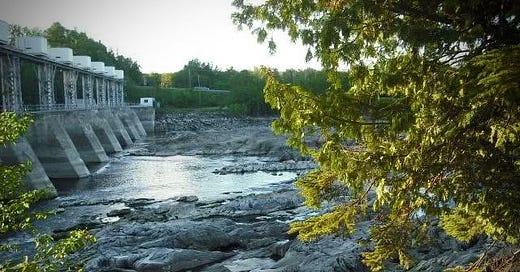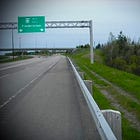I remember pedaling to school with my grandmother when I was in kindergarten. It was about 20 minutes. I had no idea that simple ritual would shape the way I moved through the world.
She passed down her wisdom quietly—about exercise, food, and paying attention to your body.
I wouldn’t understand the depth of it for years.
Now I was beyond Fredericton.
My partner had gone back to work.
There were no friends between me and Montreal.
This stretch of the TransCanada felt different—more isolated, less forgiving. Towns were further apart. The road ran through quiet forests, long hills, and long silences. I was now entering a part of the trip where I was truly alone.
And reality was setting in.
“I guess I’m really doing this,” I thought.
“Montreal, at least.”
At this point in my life, I drank a lot. Mostly beer.
Not really to escape—more to slow things down.
I didn’t yet know about my neurodivergence.
But now, looking back, it makes sense why a CNS depressant became my drug of choice.
On this trip, I drank less—but I wasn’t sober.
Still, something was shifting.
Alone with the Wind
The further west I went, the more I felt it: the wind.
In Nova Scotia, it was mostly side wind.
But here, outside of Grand Falls, I hit my first real headwind.
I’d read about it—how biking west meant fighting the wind almost the whole way.
But reading about it is one thing.
Feeling it beat you down for hours is another.
That day, it broke me.
I was tired, sore, flooded with memories.
Traumas and joys mixing in my mind.
The wind wouldn’t let up.
And there on the side of the TransCanada, I stopped and broke down crying.
I didn’t want to be there anymore.
I wanted to be home.
Anywhere but here.
I called my partner. Still not far from Fredericton. He offered to come meet me.
I said no—I didn’t want to inconvenience him.
(Another classic neurodivergent moment—rigid thinking, unnecessary self-denial, all in the name of being “not a burden.”)
But I’m glad I said no.
Because the next part changed everything.
The Saint John River
I pulled myself together and biked a few more hours. Found a small town. Found a cheap motel. Got two beers and went out to explore.
New Brunswick is very French.
It was my first time alone in a place where I didn’t speak the primary language.
That, too, felt like a kind of wind.
After a walk by the Saint John River, I was in awe. I’d read about it in history books. But standing in front of it, away from cities—seeing it in motion—was something else.
Across the bridge I found a little burger place.
Sat down. Ate in silence. Reflected.
I followed a path down toward the river.
It was a weeknight in May. Quiet. Cold, but not freezing.
The sky had that kind of hush that makes you pay attention.
I found a spot with the perfect view of the dam.
And right there, beside it, stood a memorial.
A plaque dedicated to the workers who had died building this place.
At its center was a poem I’d never read before—The Sons of Martha by Rudyard Kipling.
I read it.
Then I read it again.
“They do not preach that their God will rouse them
A little before the nuts work loose…
Wary and watchful all their days,
That their brethren’s days may be long in the land.”
It hit something deep.
That quiet service.
That invisible endurance.
That life lived without applause.
It was everything I’d been feeling but hadn’t yet put into words.
I sat down, cracked open a tall can, and just breathed.
Watching the river move. Listening to the wind.
Letting the Current carry what it needed to.
If I’d given up earlier that day, I never would’ve seen this.
Never would’ve felt it.
And I carry that moment with me still.
The Next Morning
Something felt different.
I wasn’t less sore. The wind hadn’t stopped.
But I had a new rhythm.
I knew I could keep going.
The wind didn't stop. The road didn't get easier.
But something inside me had changed.
And that was enough.
My path continues next Saturday
— Red
www.redshanti.com
👉 ko-fi.com/redshanti
Support the rhythm.
Last Saturday
Last Wednesday







I’m glad you never gave up and kept pushing forward, against the wind, against all odds, with the sheer determination like the river current flowing forward.
Thank you for this journey into the self—into memory, the past and the future—as the person you were becoming unfolds with the country itself. Your writing carries the cadences and clarity of poetry, the rhythm of muscles and breath moving against the headwinds. I look forward to next Saturday’s path.